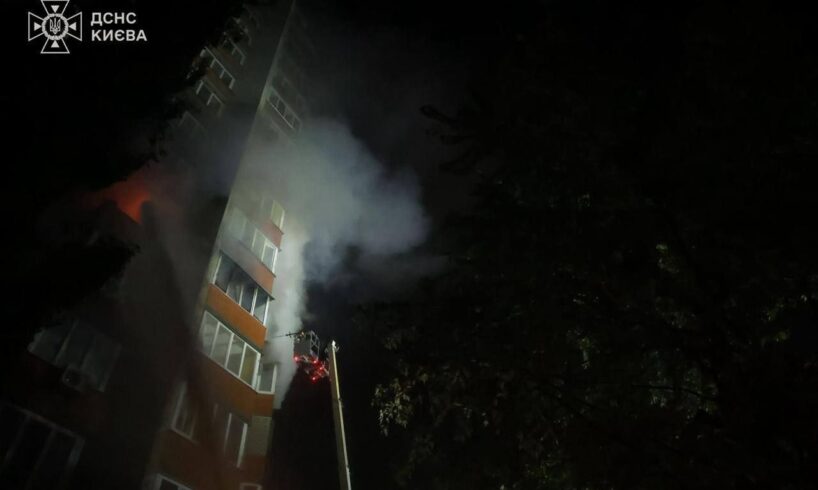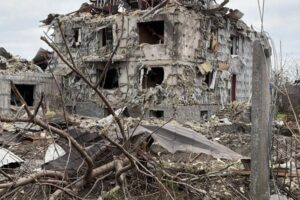
Editor’s Note: This is a developing story.
Explosions rocked Kyiv and other Ukrainian cities overnight on Oct. 22 as Russia launched a large-scale aerial attack against Ukraine.
Kyiv residents heard explosions in the city at around 1:10 a.m. local time, shortly after the Air Force issued a ballistic missile warning, according to Kyiv Independent journalists on the ground. Several more rounds of explosions kicked off about 30 minutes later.
Explosions have also been reported in Dnipro, Zaporizhzhia, and the port city of Izmail.
Air defense units are working to repel the attack against Kyiv, Mayor Vitali Klitschko reported and an air raid alert was still in place as of 8:20 a.m. Kyiv time.
Klitschko said that two people had been killed in Kyiv, and five others injured including a two-year-old child. Power outages have been reported in parts of the capital.
Several fires broke out in the city and medics have been dispatched to attack sites. The mayor also reported vehicle fires and damage to the windows and courtyards of some residential buildings.
A fire broke out in a high-rise building on the 8th and 9th floors in Kyiv’s Dniprovskyi district as a result of the drone attack, according to Tymur Tkachenko, head of the Kyiv City Military Administration.
“A fire broke out on the 8th and 9th floors of a high-rise building in the Dniprovskyi district following an enemy attack,” Tkachenko wrote on Telegram.
Kyiv Mayor Vitali Klitschko said the blaze in the Dniprovskyi high-rise had been contained, adding that emergency services rescued ten people from the building.
Emergency services also responded to another incident in the Darnytskyi district, where a non-residential building reportedly caught fire.
As of early morning, firefighting and rescue operations remain underway across the capital.
A residential building in flames following a large-scale Russian attack overnight on Oct. 22. (Ivan Fedorov / Telegram)
The attack comes shortly after Ukraine launched Storm Shadow missiles in a mass strike on Russia, according to the General Staff. The attack allegedly struck Russia’s Bryansk Chemical Plant, which produces key components for Russian missiles.
The attack also caused damage to residential neighborhoods and critical infrastructure in other parts of Ukraine. An apartment building in Zaporizhzhia was damaged overnight, Governor Ivan Fedorov said. At least fifteen civilians were injured and are receiving medical care.
The attacks in Izmail, Odesa Oblast, reportedly caused power outages in the city. Recent attacks on the region’s energy facilities have left thousands of households without power.
Russia’s latest mass attack comes amid an intensified assault against Ukraine’s energy facilities ahead of winter. A deadly missile strike on Kyiv on Oct. 10 damaged a thermal power plant and triggered large-scale blackouts.
President Volodymyr Zelensky warned on Oct. 21 that Russia would only escalate attacks on Ukraine’s power grid as international pressure — and the threat of U.S.-supplied Tomahawk missiles — fades.
Less than a week ago, hopes that the U.S. would provide Ukraine with Tomahawk cruise missiles and place real pressure on Russia were high, but were derailed by a phone call from Russian President Vladimir Putin to the White House.
Zelensky has argued that “long-range sanctions,” in the form of Ukrainian strikes against Russian military and energy facilities, are key to forcing Moscow to the negotiating table. While Ukraine currently uses domestically produced drones to target these sites, the president has called for international partners to mount pressure on the Kremlin by supplying long-range missiles.
In a rare long-range missile strike against Russian territory, the Ukrainian military on Oct. 21 launched British Storm Shadows in a combined attack that hit the Bryansk Chemical Plant. The factory produces gunpowder and rocket fuel and is subject to international sanctions.
Earlier this month, the Wall Street Journal (WSJ) reported that the U.S. will begin intelligence sharing with Ukraine to support long-range missile strikes on Russia’s energy infrastructure.
Russia’s children’s commissioner shamelessly describes kidnapping a Ukrainian child
Maria Lvova-Belova openly said around 20,000 Ukrainian children have been taken by Russia,





